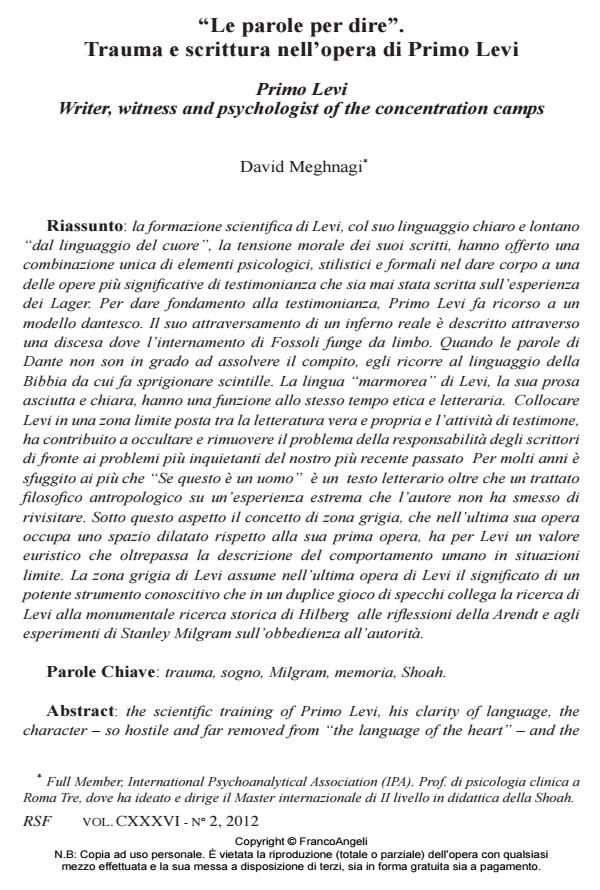Primo Levi. Writer, witness and psychologist of the concentration camps
Journal title RIVISTA SPERIMENTALE DI FRENIATRIA
Author/s David Meghnagi
Publishing Year 2012 Issue 2012/2
Language Italian Pages 24 P. 39-62 File size 1675 KB
DOI 10.3280/RSF2012-002003
DOI is like a bar code for intellectual property: to have more infomation
click here
Below, you can see the article first page
If you want to buy this article in PDF format, you can do it, following the instructions to buy download credits

FrancoAngeli is member of Publishers International Linking Association, Inc (PILA), a not-for-profit association which run the CrossRef service enabling links to and from online scholarly content.
The scientific training of Primo Levi, his clarity of language, the character - so hostile and far removed from "the language of the heart" - and the moral tension of his writing all created a unique combination of psychological, stylistic and formal elements to give form to the most significant personal testimony ever written about experience in a Nazi concentration camp. Primo Levi builds his text using a Dantesque model; for instance, he describes the experience in the camp of Fossoli employing Dante’s image of the limbo. When Dante’s words don’t come to help him, he turns to the language of the Bible to imbue his style with fire. Levi’s marmoreal language, his dry, clear prose style, turned a moral duty into a literary strategy. Placing him on the borderline between a writer of true literature and a producer of written testimony only contributes to concealing and removing the question of writers’ responsibility when dealing with the most disturbing problems of our most recent past. For many years the majority of readers failed to realize that "Se questo è un uomo" (If This is a Man) is a philosophical and anthropological study of a drastic experience. In this respect, Levi’s concept of "grey zone" - more present in his last work than in his first - has for him a heuristic value that goes beyond the description of human behavior in extreme situations. In his last work, this "grey zone" becomes a powerful cognitive instrument, which through a dual mirroring process, connects Levi’s research with Hilberg’s, Arendt’s and Stanley Milgram’s work.
Keywords: Trauma, dream, Milgram, memory, Shoah.
- La psicoanalisi di Enzo Bonaventura. Attualità di un pensiero, storia di una rimozione David Meghnagi, in PSICOTERAPIA E SCIENZE UMANE 2/2017 pp.247
DOI: 10.3280/PU2017-002004
David Meghnagi, "Le parole per dire". Trauma e scrittura nell’opera di Primo Levi in "RIVISTA SPERIMENTALE DI FRENIATRIA" 2/2012, pp 39-62, DOI: 10.3280/RSF2012-002003